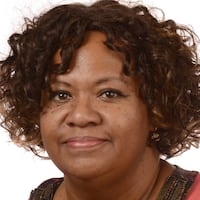A little more than year after a recording full of racial epithets and threats against black workers raised a public outcry and cost the former Buford City Schools superintendent his job, voters left most members of the school board, who apologized for that behavior, in office.
Three seats were filled in the election. Two incumbents were re-elected and a third did not run again.
Incumbent Daren Perkins, who’s been on the board since 2005, beat challenger Melissa Ferris-Ozkan 565-174, and Phillip Beard, who is also the longtime city commission leader, ran unopposed, ensuring his tenure of more than four decades will continue. According to the city charter, Beard’s city commission seat makes him the school board chairman.
“I am excited for the opportunity to serve the Buford schools for another four years … We plan to continue the academic excellence that Buford is known for by providing the resources our teachers and students need to reach their goals,” said Perkins, a 1990 Buford High graduate and gas supervisor for Buford Gas, through the district communications office.
A request for comment from Beard went unanswered. He has said in the past he will no longer speak to The AJC.
» Related story: Buford school board candidates qualify for November election
» Related story: Buford unveils $85 million school complex
» Related story: Buford’s new superintendent tasked with repairing a community
Matt Peevy beat another newcomer, Georgia Tech professor Lien Diaz 523-224. Peevy, a 2000 Buford High graduate, will occupy the seat vacated by Beth Lancaster, who chose not to run again.
“I have lived in Buford my whole life and seen many changes occur, but what has remained the same is the strong community support that is the foundation for our schools,” Peevy said through a news release from the school district. “My experience serving on other boards, as well as being a business owner, will lend itself to bringing a different perspective to the discussions about our vision for the district. I look forward to serving my community in this capacity.”
At an August 2018 school board meeting, a standing-room-only crowd vowed to vote a new board into office, many saying the school board had not done enough to rebuke former Superintendent Geye Hamby over the recorded racist remarks.
In the end, Hamby was fired without severance pay, a diversity committee was formed and more racially diverse staff, including Buford High’s first black head football coach, were hired.
According to one political analyst, threatening to remake a school board at the polls is easier said than done.
Bill Crane, a 25-year communications strategist for broadcast as well as state and national politicians, said a lot more is required of school board members these days than 30 or 40 years ago.
“Most school board positions are voluntary and although they are called part-time, there’s so much involved in even small districts, it can be as much work as any full-time job,” he said. “And besides having a passion for education and willingness to help children, school board members need to know about finance, legal issues, state and federal regulations and keep up on changes in education technology and techniques.”
Anyone with that kind of resume would most likely be running their own company, Crane said. Regardless, many working adults wouldn’t have time to devote to such a demanding job.
James Taylor, president of Black Men United for Children and Humanity, a Gwinnett County-based education advocacy group, disagrees.
“There are processes in place to teach anyone who’s passionate about helping make education better learn what they need to know,” said the former Gwinnett County Public Schools administrator.
His group was among the most vocal at Buford school board meetings condemning what they called a climate of racial divisiveness.
“Did they do enough?” said Taylor. “The community seems to think so and if they continue on this trajectory perhaps all will be forgiven.”
“It’s not easy to unseat an incumbent, but it’s not impossible. The people have spoken and for the next two years at least, they are content with the board that is in place.”
About the Author
The Latest
Featured


